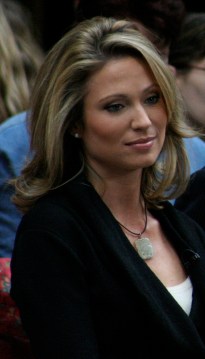Last month, a prominent former Georgian had a mammogram in front of millions of people – a test that eventually produced stunning results.
Amy Robach, 40, an anchor on ABC’s “Good Morning America,” didn’t figure she had cancer. It was her first mammogram, and she had been putting it off.
“In fact, I would have considered it virtually impossible that I would have cancer,’’ Robach said in an ABC blog post. “I work out, I eat right, I take care of myself and I have very little family history; in fact, all of my grandparents are still alive.”
Several producers and her on-air colleague Robin Roberts, a breast cancer survivor, had convinced Robach that doing the test on live television on “Good Morning America” would save lives.
This week, Robach, a graduate of Snellville’s Brookwood High and the University of Georgia, announced that she has breast cancer. She said on her blog post that she is scheduled to undergo surgery Thursday.
Yet her diagnosis would not have been made if she had followed some federal guidelines for screening.
The U.S. Preventive Services Task Force, a group of independent experts, advised in 2009 that most women should start regular breast cancer at age 50, not 40.
The recommendations, which do not apply to the small group of women with unusual risk factors for breast cancer, reversed longstanding guidelines and were aimed at
reducing harm from overtreatment, the group said. It also said women ages 50 to 74 should have mammograms every two years, rather than every year.
The task force based its conclusion on the potential costs, both economic and emotional, of uncertain mammogram results.
While many women do not think a screening test can be harmful, medical experts say the risks are real, the New York Times reported. A test can trigger unnecessary further tests, like biopsies, that can create extreme anxiety. And mammograms can find cancers that grow so slowly that they never would be noticed in a woman’s lifetime, resulting in unnecessary treatment.
Overall, the report said, the modest benefit of mammograms — reducing the breast cancer death rate by 15 percent — must be weighed against the harms.
But maximizing public health and decreasing harm may be at odds with minimizing an individual woman’s risk of dying of breast cancer, a Time.com article reported this week. And that’s the situation that “we see every day in my field,” Dr. Larry Norton, a breast cancer expert at Memorial Sloan Kettering Cancer Center, said in a Time.com article.
“I don’t want to imagine what could have happened if [Robach] had her first mammogram at age 50,” said Norton of Robach’s case.
The American Cancer Society still recommends yearly mammograms starting at age 40 and continuing for as long as a woman is in good health.
Robach’s screening on television follows the example of broadcaster Katie Couric, who had a colonoscopy on NBC’s “Today” show in 2000. Her husband had died of colon cancer two years before.
Colonoscopies increased 20 percent after Couric’s procedure.
Robach said in her blog post, “I can only hope my story will . . . inspire every woman who hears it to get a mammogram, to take a self-exam. No excuses. It is the difference between life and death.”
Robach spent much of her youth in Georgia and earned her broadcast journalism degree at UGA. A talented singer, she was a finalist for the title of Miss Georgia in the Miss America system in 1994. She has reported and anchored programs for both NBC and ABC, and is married to social networking executive Andrew Shue, a former TV actor.
She said doctors will perform a bilateral mastectomy followed by reconstructive surgery.
“And while everyone who gets cancer is clearly unlucky, I got lucky by catching it early, and there are so many people to thank for making sure I did,’’ she wrote in her blog post. Every producer, every person who urged me to do this, changed my trajectory.
“The doctors told me bluntly: ‘That mammogram just saved your life.’ ”

